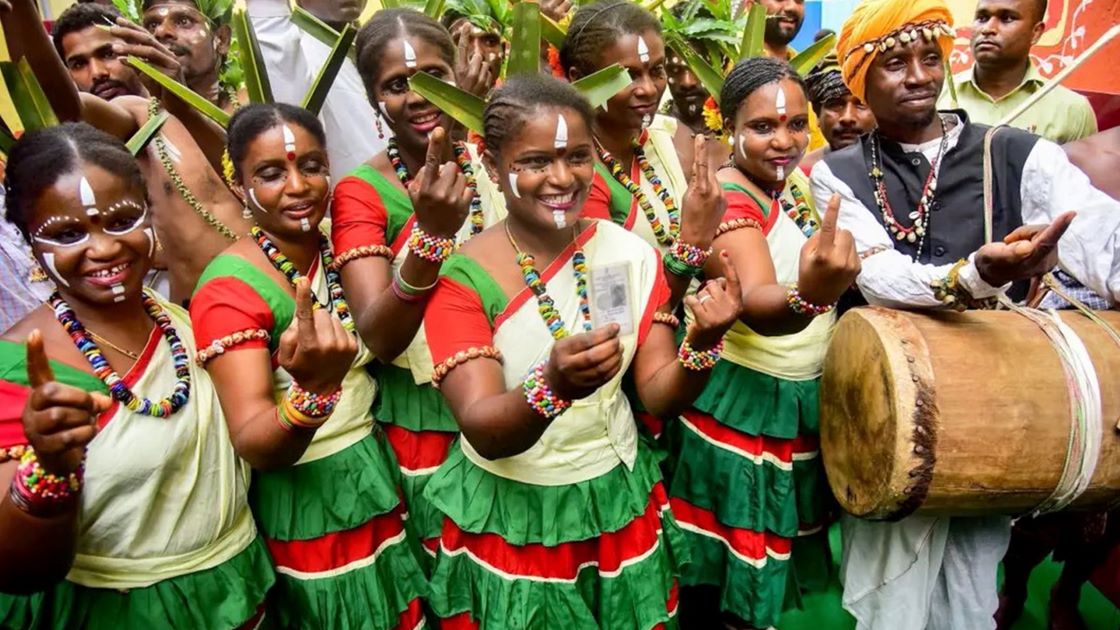
Chhattisgarh, a state established with the aim of fostering improved welfare and representation for tribal communities, is still awaiting substantial development and transformation for these marginalised groups. Constituting 30.6% of the total population, Scheduled Tribes (STs) in Chhattisgarh hold significant sway, with 29 seats reserved for them in the 90-member state legislative assembly. The influence and impact of tribal votes cannot be underestimated, drawing both the Bharatiya Janata Party (BJP) and the Congress into a fierce competition for their support, evident in their extensive outreach efforts in tribal areas.
Adding a layer of complexity to the political landscape is the emergence of an independent party, Sarva Adivasi Samaj, led by former Member of Parliament Arvind Netam. Netam, a seasoned politician who has previously served as a minister in governments led by Indira Gandhi and Rajiv Gandhi, asserts that both the BJP and Congress have failed the tribal communities. In response, Sarva Adivasi Samaj has fielded its own candidates, disrupting the traditional two-party dominance and transforming the electoral landscape into a more intricate and competitive affair.
In the 2003 assembly elections, BJP secured victory in the majority of the seats reserved for STs. In the 2008 Assembly elections, despite a reduction in ST reserved seats from 34 to 29 due to delimitation, the BJP secured majority seats.
| Party | 2003 AE | 2008 AE | 2013 AE | 2018 AE |
|---|---|---|---|---|
| BJP | 25 | 19 | 11 | 4 |
| INC | 9 | 10 | 18 | 25 |
Source : ECI
However, in 2013, tribals shifted their allegiance to Congress but the party fell short of an absolute majority with BJP forming a government for the third consecutive term. In the 2018 assembly elections, the Congress dominated, winning 25 out of 29 ST-reserved seats. However, facing fierce competition from the BJP and independent parties in the upcoming election, the incumbent Congress is now in a challenging position for securing tribal votes.
In Chhattisgarh, tensions have escalated as non-converting tribal communities have attacked churches. Burial opportunities are being denied to those who have converted to Christianity, leading to heightened conflict. Discontent among converted tribals towards the Congress government is growing, further exacerbated by the ongoing "Silger Andolan" , a movement that’s more than two years old now, began after the tragic deaths of three tribal youths during protests against security forces. Between 2000 and 2020, 1,769 Adivasis were killed on suspicion of being police informers, according to police records coupled with numerous false arrests on charges of being Maoists, underscores a systemic failure that the Congress has been unable to address.
These lapses have given rise to smaller parties, with protests against mining activities further eroding the Congress's support among tribals. In this climate, there is a growing likelihood that tribals may gravitate towards alternative options, such as the CPI or the recently established “Sarva Adivasi Samaj” party.
However, the Congress is banking on Chief Minister Baghel's multifaceted initiatives and schemes tailored for the welfare of tribal communities. Upon assuming power, the Congress government facilitated the return of acquired land to tribals, originally earmarked for a TATA steel project. Notably, there has been an augmentation of support prices for forest produce and an increase in paddy prices. The CM while unveiling developmental projects amounting to Rs 643 crore in Jagdalpur, Baghel revealed plans for BED and DED schools in all district headquarters, and the establishment of residential school hostels for tribal boys and girls in Tokapal and Lohandiguda. Mukhyamantri Haat Bazaar clinic, a scheme aimed to provide quality healthcare facilities in remote areas has turned out to be a major relief for Tribal people living in forested pockets of Bastar and Surguja region. Coupled with the implementation of the PESA act, these measures have the potential to influence voters in favour of the Congress.
However, the BJP consistently emphasises the issues of tribal conversions and alleges corruption within the Congress-led government. Amit Shah claimed that religious conversions are on the rise since Congress came into power. Prime Minister Narendra Modi, during a rally, highlighted the significant achievement of President Droupadi Murmu, a member of the tribal community. He posed a poignant question to the audience, if anyone had envisioned a tribal woman becoming President.
In Contrast, the Congress critiques the BJP's treatment of tribal communities. During a public meeting in Jagdalpur, situated in the tribal-dominated Bastar region, Rahul Gandhi took a direct jab at the BJP for allegedly disrespecting tribals by labelling them as 'vanvasis' instead of 'adivasis.' Moreover, he pointed out specific instances of BJP MLAs showing disrespect towards the tribal community. Rahul Gandhi went further to accuse the Bharatiya Janata Party of stifling tribal aspirations by hindering access to English medium school education.
As Chhattisgarh heads into the upcoming assembly elections, the political choices made by the tribal electorate will not only determine the state's leadership but also reflect the evolving socio-political aspirations of its tribal communities. Tribal inclination in the 2023 Chhattisgarh elections will be interesting to look out for. Watch out for more articles to keep getting more interesting insights on Madhya Pradesh 2023 Assembly Elections and Chhattisgarh 2023 Assembly Elections.
References:

Dhruv Research owned by DHRUVA RESEARCH
Copyright © 2021
DHRUVA RESEARCH.
All rights reserved.